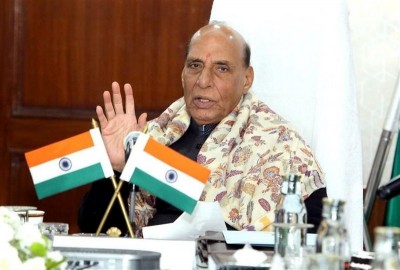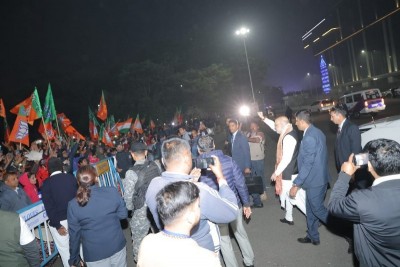 Khalistan
Khalistan
From no-fly list to parliamentary tribute: Nijjar Paradox in Canada
Canada’s Deputy Prime Minister, Chrystia Freeland, recently found herself in the eye of a political storm when questioned about the government’s seemingly contradictory stance on Khalistani separatist Hardeep Singh Nijjar.
Once deemed a threat with his name on a no-fly list and his bank accounts frozen, Nijjar is now being honoured posthumously in the Canadian Parliament. This shift has sparked a heated debate and raised serious questions about the integrity of Canada’s political and judicial systems.
In a video that has rapidly gained traction on social media, a journalist posed the burning question to Freeland: Why is Nijjar, a man previously targeted by government sanctions, now being memorialized? Freeland’s response was anything but clear-cut. She sidestepped the core issue, choosing instead to focus on the recent anniversary of Nijjar’s murder and the broader implications of such an act on Canadian soil.
“I do want to start by saying that this week was a very sad and solemn anniversary of the murder. I was in the House of Commons, and I guess all three of us were,” Freeland began, referencing the presence of her colleagues. She underscored the importance of recognizing the murder of a Canadian in Canada, labeling it “entirely unacceptable.” She further praised Prime Minister Justin Trudeau’s strong post-assassination stance, calling it both necessary and challenging.
However, Freeland’s comments failed to address the fundamental contradiction at play. She did not explain why Nijjar was on the no-fly list, why his bank accounts were frozen, or why Parliament chose to pay tribute to him. Her evasion of these critical questions only fuels the speculation and skepticism surrounding the government’s motives.
“The government of Canada will enforce our laws and protect all Canadians regardless of who is threatening them and what the consequences might be,” Freeland asserted, lauding Trudeau’s commitment to the protection of Canadian citizens. Yet, the underlying issue remains: if Nijjar was deemed dangerous enough to warrant severe restrictions while alive, what has changed to merit such a tribute after his death?
Adding to the controversy is a recent ruling by the Federal Court of Appeal in Canada, reaffirming the significant threat posed by individuals associated with Khalistani extremism. This ruling underscores the ongoing danger, yet the government’s actions suggest a perplexing shift towards appeasement.
Critics argue that this sudden change in stance is a politically motivated move, aimed at consolidating votes amidst Trudeau’s declining approval ratings. The tribute to Nijjar, seen by some as a gesture of appeasement, risks undermining the very laws and principles that are meant to safeguard the nation.
Surprisingly though, this is not the first time for the Canadian parliament to do something like this. In September 2023 the then speaker of Canada’s parliament had to resign after inviting a Ukrainian Nazi veteran to attend a special session of parliament, and then calling the man a “hero” amid two standing ovations.
The Canadian administration’s handling of this situation raises serious concerns about its commitment to justice and security. It appears that political expediency may be taking precedence over principled governance. As Freeland avoided the pressing questions, Canadians are left to wonder about the true motives behind these actions.
In a democracy, transparency and accountability are paramount. The government owes it to its citizens to provide clear, honest answers about its decisions, especially when those decisions involve individuals previously deemed a threat. The tribute to Hardeep Singh Nijjar, without a transparent rationale, casts a shadow over Canada’s commitment to justice and security.
This incident should serve as a wake-up call for all Canadians. It’s a reminder of the need for vigilance and scrutiny in holding our leaders accountable. The paradox of honouring Nijjar, despite past actions against him, demands answers. Until those answers are provided, the cloud of doubt will continue to hang over the halls of Parliament, casting a long shadow over Canada’s democratic values.
(Text and Image courtesy: Khalsavox.com)
Support Our Journalism
We cannot do without you.. your contribution supports unbiased journalism
IBNS is not driven by any ism- not wokeism, not racism, not skewed secularism, not hyper right-wing or left liberal ideals, nor by any hardline religious beliefs or hyper nationalism. We want to serve you good old objective news, as they are. We do not judge or preach. We let people decide for themselves. We only try to present factual and well-sourced news.







